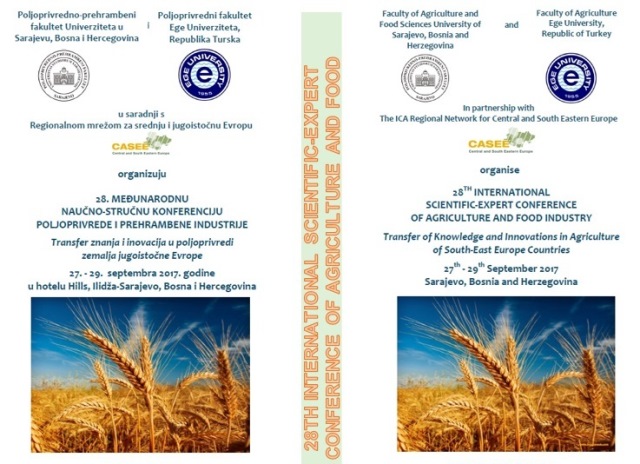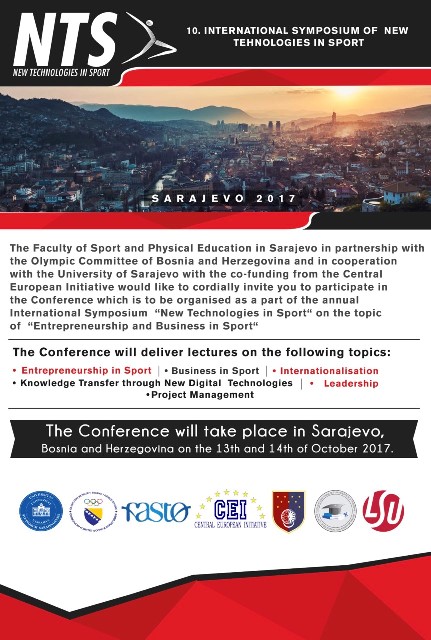|

The First SE European Conference on Ichthyology (SEEIC 2017)
Under the University of Sarajevo’s auspices, the Institute for
Genetic Engineering and Biotechnology (INGEB) and the Faculty of Natural
Sciences and Mathematics (PMF) organize the First SE European
Conference on Ichthyology (SEEIC 2017). The Conference will be held in
the Hollywood Hotel, Sarajevo, B&H from 27 to 29 September 2017.
The opening will be held on Wednesday, 27September 2017, at 9:30.
The SEEIC honors the First European Congress on Ichthyology held in
Sarajevo in 1973 and will be dedicated to the life and work of an
esteemed ichthyologist and expert Prof. Dr. Tonko Soljan.
Papers presented at the Conference that meet review criteria will be published in the special issues of journals Acta Adriatica (Marine Ecosystems) and the Croatian Journal of Fisheries (freshwater ecosystems).
All relevant information regarding the conference can be found at https//:www.seeic.eu.

28th International Expert Conference on Agriculture and Food Industry
The UNSA Faculty of Agriculture and Food Sciences with the Ege
University Faculty of Agriculture (Turkey), in cooperation with the
Regional Network for Central and Southeast Europe (CASEE) organize the
28th International Expert Conference on the Agriculture and Food
Industry.
The Conference will be held at the Hotel Hills, Ilidza, Sarajevo
from 27 to 29 September 2017. The conference opens on 28 September 2017,
at 10:00.
The topic of the plenary session is “Agriculture Knowledge and
Innovation Transfer to the South East Europe Countries”. The
introductory speakers will: Prof. Dr. Andrea Knierim (University of
Hohenheim), M.Sc. Donald Aquilina and Dr. Cosmin Salasan. 134 papers
from the field of agriculture and food sciences are submitted from 10
countries. The conference will be organized in four sections:
Agricultural plant production; Animal farming, Food technology and
sustainable development of agro-industry and rural areas.
For more details, please visit the web site: www.ppf.unsa.ba.
CONFERENCE AGENDA

Invitation to the Conference “Entrepreneurship and Business in Sports”
International Symposium “New Sports Technologies”
The UNSA Faculty of Sports and Physical Education, in cooperation
with the Olympic Committee of Bosnia and Herzegovina, with the
University of Sarajevo’s support and co-financing by the Central
European Initiative, is pleased to invite you to participate in the
conference on “Entrepreneurship and Business in Sports “ in Sarajevo, as
a part of the International Symposium New Sports Technology 2017 that
takes place on 13 and 14 October 2017.
The overall goal of the conference is to raise awareness of the
benefits of entrepreneurship in sport, increase the level of innovation
and modernization in higher education, provide the latest information on
entrepreneurship in the European Union and its application in the EU
and EU candidate countries.
Call for Papers
Public and Applied History on the Battlefield of Europe. Dealing with Painful Pasts in the 20th Century
First conference of the Jean Monnet Network “Applied European Contemporary History”
History and representations of the past have become an increasingly
public issue, especially over the past decades. The prerogative of
interpretation no longer belongs exclusively to scholars and
institutions related to universities. The reasons for this vary. Civil
society, for instance, increasingly wishes to have a voice in
representing pasts that were experienced as painful (which e.g. holds
true for NGOs in post--‐war or post--‐dictatorship societies). Another
reason might be the effort to tell histories from below which so far
have been neglected by academic discourse, as with the history workshop
movement in Great Britain, Germany and other European countries. Yet a
completely different explanation point toward the nostalgic
appropriation of the past often found in local heritage and history
societies.
In this situation of change historical sciences are undergoing a
phase of adaptation in order to recognize the democratization of the
production of historical knowledge. Public and Applied History are
aiming at responding to this challenge. They provide an innovative
approach to historical sciences that deals with the intersections
between academic research and society’s methods of producing historical
knowledge. While Public History can be described as the broad and
overarching concept that deals with the uses of the past in public,
Applied History as its subordinate field explores more specifically how
historical knowledge is made; how interpretations of the past impact
society; why there is a societal need to deal with the past at all; and
finally, what effect these issues have on the scientific methods of
historical research.
In doing so Public and Applied History can provide an innovative
contribution to that highlights historical science’s European scope.
This approach is the underlying idea of the Jean Monnet Network “Applied
European Contemporary History.” As part of the broad field of Public
History, the network aims to how methods of dealing with the past can be
informed by a deeper understanding of the historical cultures of the
neighbouring European countries. Comprising members from Belgium, Bosnia
and Herzegovina, Germany, Poland, and Serbia, the network strives to
explain national cultures of history in their specific constructions and
further create relationships between them, thus making potential
conflicts both appreciated and understood. A central issue is how
societies come to terms with experiences of war and violence and of
guilt and victimhood in the 20th century.
At the same time the network aims to sharpen the methodology and
didactics of this approach through a transnational dialogue beyond its
participants. During our first conference, we would like to discuss the
network’s approach with interested scholars and practitioners from
European countries in order to map the European landscape of Public and
Applied History.
In a first step, we would like to explore the similarities and
differences between theoretical and analytical approaches to and
terminology of Public and Applied History (not always necessarily
labelled as such) and their uses in different national contexts
throughout Europe. Initially these discussions were stipulated by the
discourse concerning “memory” and “remembrance.” As the field has been
developing dynamically, the references and connections between the
memory discourse and Public and Applied History should be scrutinized in
this panel, too.
The papers in this section could address the following questions:
- When and why did “memory” become a crucial concept in the humanities in the respective countries?
- Which terms regarding Memory Studies and Public and Applied History
have been coined so far? To what theoretical concepts do these terms
refer?
- To what extent do transfer processes between countries and
scientific communities play a role when new terms are coined in the
field of Memory Studies / Public and Applied History?
- The debates in Memory Studies and Public and Applied History respond to what social needs?
- How do practitioners who work in sites of memory, museums,
education, and other realms outside universities view the debate on
Memory Studies and Public and Applied History?
In a second step, we would like to discuss case studies in Public
and Applied History from European countries that are concerned with
dealing with painful pasts in the 20th century. These case studies
should focus on national frameworks of Public or Applied History as well
as emphasize transnational constellations.
Questions addressed by these papers might be:
- To what extent does civil society claim to be an actor in the
production, representation and implementation of historical knowledge?
To what need(s) do civil society actors respond, and what aims do they
follow when engaging in public history or memory work?
- To what theoretical concepts do these initiatives refer? To what extent do transnational networks play a role?
- How far do initiatives from below contribute to a democratization of the production of historical knowledge?
- How are negotiations shaped by public history actors and
representatives of official politics of remembrance in cases of
contested pasts? How do initiatives from below interfere with politics
of history education?
- What alternative histories do these initiatives try to tell? What
narratives do they shape? And concerning painful pasts: Where are limits
of understanding the Other?
The conference will take place at Friedrich Schiller University,
Jena, Germany, from November 7th to November 9th. Accommodation and
travelling costs will be arranged and covered. The conference will take
place in English.
If interested, please send an abstract (no longer than 300 words) and a short CV by July 15th, 2017 to Dennis Dierks (
This e-mail address is being protected from spam bots, you need JavaScript enabled to view it
) and Juliane Tomann (
This e-mail address is being protected from spam bots, you need JavaScript enabled to view it
).
6th biennial international conference
"INFuture2017: Integrating ICT in Society"
http://infoz.ffzg.hr/INFuture/
8-10 November 2017
The Westin Zagreb Hotel, Zagreb, Croatia
organised by
Department of Information and Communication Sciences
Faculty of Humanities and Social Sciences
University of Zagreb, Croatia
Conference topics:
1. Governmental and Business Sector Informatics (G&B)
2. e-Health Applications and Solutions (e-H)
3. Human-Computer Interaction and Language Technologies (HCI<)
4. Digitisation, Records Management and Digital Preservation (D-RM-DP)
5. Personal Digital Information Management (PDIM)
6. e-Science (eSCI)
7. Her.IT.age (HIT)
8. Community Informatics (CI)
9. Integration of ICT in Education (ICT-E)
10. e-Encyclopaedia (e-E) - topic organised in association with The Miroslav Krleža Institute of Lexicography
The European Association for Banking and Financial History’s (eabh) Workshop will be held during the INFuture2017 conference.
We invite you to submit your paper in one of several paper
categories. Details about the conference topics and paper categories can
be found at:
http://infoz.ffzg.hr/INFuture/conference/conference-topics
Papers undergo international double blind peer review, and will be published for the conference. INFuture publications are indexed by EBSCO. Other relevant databases are being considered.
Submission deadline is 1 May 2017.
Call for papers can be downloaded in PDF from:
http://infoz.ffzg.hr/infuture/images/INFuture2017-CfP%20v1.pdf
The European Association for Banking and Financial History’s (eabh) Workshop will be held on Friday 10 November 2017.
Organisational team is ready to answer all your questions!
Contact us at
This e-mail address is being protected from spam bots, you need JavaScript enabled to view it
|
